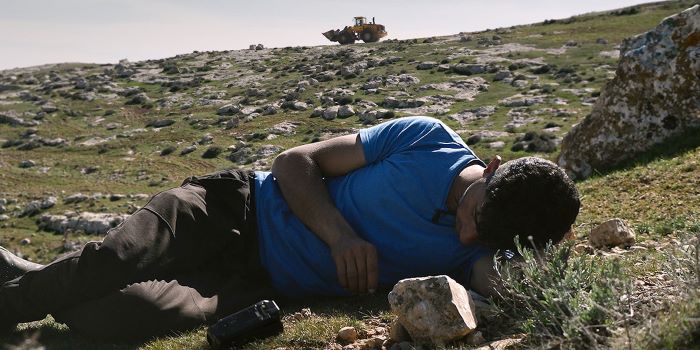![]() It may seem odd to offer a spoiler alert for a documentary. This is to say that many films unfold within the illuminating and incisive No Other Land, which had its Canadian premiere at the Toronto International Film Festival. One narrative doesn’t really come into focus until the conclusion. Meanwhile, the main subject remains compelling throughout: Masafer Yatta, a rural region in the mountainous southern West Bank and a specific example of Israel’s control of the occupied territory. Through witnessing the ripple effects of the occupation, the Israeli-Palestinian directing team offers a much more illustrative and expansive coverage of Israeli actions in the West Bank than, say, the recent Last Week Tonight with John Oliver segment on the illegal expansion of Israeli settlements.
It may seem odd to offer a spoiler alert for a documentary. This is to say that many films unfold within the illuminating and incisive No Other Land, which had its Canadian premiere at the Toronto International Film Festival. One narrative doesn’t really come into focus until the conclusion. Meanwhile, the main subject remains compelling throughout: Masafer Yatta, a rural region in the mountainous southern West Bank and a specific example of Israel’s control of the occupied territory. Through witnessing the ripple effects of the occupation, the Israeli-Palestinian directing team offers a much more illustrative and expansive coverage of Israeli actions in the West Bank than, say, the recent Last Week Tonight with John Oliver segment on the illegal expansion of Israeli settlements.
For 22 years, farming villages have fought against the demolition of their homes by the Israeli Defense Forces. The IDF claims the land as a training ground. In the winter of 2020, Israel’s Supreme Court ruled that the eviction was lawful. It would be the single largest forced West Bank expulsion since the 1967 occupation.
The timeline begins decades earlier with homemade footage of the activist parents of twentysomething Basel Adra, who joined his community in protest to Israeli incursions, participating in his first march at age seven. His still-active father Nasser is arrested (again) during the course of the movie. Despite living in a thinly populated, isolated area, lawyer and journalist Adra has a significant presence on Instagram, covering his village’s protests and documenting the actions of the Israeli Army and demolition teams. (Smartphones are everywhere.) He may also be familiar from his airtime on Democracy Now! and other news programs. Footage of the multiple protest crackdowns is very raw and dizzyingly chaotic. Caught on camera, the actions of Israeli soldiers are alarming—such as the destruction of a tradesman’s equipment—and violent. Two Palestinian men are shot in the mayhem.
Adra’s not the only filmmaker documenting the resistance in the West Bank. Yuval Abraham, a Jerusalem-based Israeli journalist, co-directs the documentary with Adra, Hamdan Ballal, and Rachel Szor. Early on, viewers may start asking questions. Why are the conversations between Adra and Abraham sometimes awkward and self-conscious? Is there something going on behind the scenes? Is Abraham crossing an ethical line by helping Adra’s community rebuild a home after it has been destroyed? Is he becoming part of this story? Indeed, the Israeli has embedded himself into the community and gracefully counters questions (in Arabic) when one neighbor asks him if he feels any responsibility for what his country is doing to the Palestinians. Their debate remains at a low simmer.
I doubt that I’m the only critic to ask if there is another eye-opening perspective of deeply personal relations between Israelis and Palestinians buried within this film. No Other Land has you wanting more. Yet what you see is powerful as a close-up of one flashpoint in the region. Most of the timeline ranges from 2019 up until mid-October 2023, an appropriate ending point, considering the events that have followed October 7.
No Other Land will open in the United States on November 1.







Leave A Comment